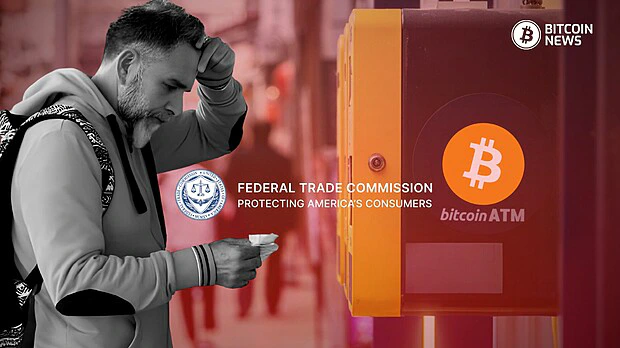Bitcoin ATM scams are on the rise, and the numbers are alarming. Reports from the Federal Trade Commission (FTC) show a nearly tenfold increase in losses due to these scams since 2020, reaching over $110 million in 2023 alone.
The trend has continued into 2024, with $65 million reported lost in just the first six months of the year.
These scams primarily target older adults, who are three times more likely than younger people to fall victim. Emma Fletcher, a senior data researcher at the FTC, noted:
“Scammers are using these machines as a way to take money from people more than we’ve seen in the past.”
Bitcoin ATMs are electronic kiosks that allow people to buy or sell bitcoin and other digital assets using cash or debit cards. Unlike traditional ATMs, these machines are linked to digital wallets instead of bank accounts.
Bitcoin ATMs are often located in high-traffic areas like convenience stores, gas stations, and supermarkets. There are now nearly 32,000 bitcoin ATMs across the United States, up from just over 4,000 in early 2020.
Related: Global Bitcoin ATM Network Faces First Decline in 10 Months
Scammers exploit these machines by convincing people to deposit cash into them, thinking they are protecting their money or fixing a problem. Here’s how it usually happens:
- Unexpected Contact: The scam often begins with an unexpected phone call, text message, or computer pop-up. The scammer pretends to be a government official, a business representative, or a tech support agent.
They claim that there is an urgent issue with the victim’s bank account or that their personal information has been linked to criminal activities like drug smuggling or money laundering. - Creating Panic: The scammer creates a sense of urgency, pressuring the victim to act quickly. The FTC explains that scammers might say, “All your money is at risk,” or “You will be arrested if you don’t act quickly.”
- Instructions to Use a Bitcoin ATM: The scammer instructs the victim to withdraw cash from their bank account and take it to a nearby bitcoin ATM.
They provide a QR code, which the victim is told to scan at the machine.
However, once the QR code is scanned, the cash is immediately transferred to the scammer’s digital wallet.
Since Bitcoin transactions are irreversible, once the money is sent, it cannot be recovered. Victims are left with no way to get their money back.
Older adults are the most common victims of these scams. According to the FTC, people over the age of 60 are more than three times as likely as younger adults to report losing money to Bitcoin ATM scams. Fletcher explains:
“These Bitcoin ATMs seem to have opened up sort of a gateway for scammers who are after cryptocurrency to target older adults.”
She also highlighted that $2 out of every $3 lost in these scams belonged to someone near or over retirement age. This makes older consumers the most vulnerable group, and scammers often take advantage of their lack of familiarity with Bitcoin and digital technologies.
Related: Everyone’s a Scammer
Most Bitcoin ATM scams involve impersonation.
The scammers pretend to be from government agencies, businesses, or tech support companies. They often claim there is an urgent need for action, like protecting savings from a supposed hack or preventing an account freeze.
Another common tactic involves fake security alerts. Scammers might impersonate a well-known tech company, like Microsoft or Apple, and claim that the victim’s computer or bank accounts have been compromised.
They then direct the victim to a Bitcoin ATM, instructing them to deposit money to “secure” their funds.
The FTC has offered several tips to protect yourself from these scams:
- Be Skeptical of Unexpected Contact: Never click on links or respond directly to unexpected calls, messages, or computer pop-ups.
If you receive a suspicious message, look up the company or agency’s phone number or website yourself. Do not use the contact information provided in the message. - Slow Down: Scammers often try to create a sense of urgency. Take your time and verify any claims made by someone asking for money. Talk to someone you trust before taking action.
- Don’t Use Bitcoin ATMs for Payments: Legitimate businesses and government agencies will never ask you to use a Bitcoin ATM to send money. If someone does, it’s a scam.
- Report Scams: If you believe you have been targeted by a scam, report it to the FTC at ReportFraud.ftc.gov.
While Bitcoin ATM operators claim to have implemented measures to prevent fraud, such as warning messages during transactions and live customer support, scams continue to rise.
As the popularity of Bitcoin ATMs grows, scammers are finding new ways to exploit them. With the number of machines increasing and losses continuing to rise, it is more important than ever for consumers to stay vigilant and protect themselves from falling victim to these scams.










